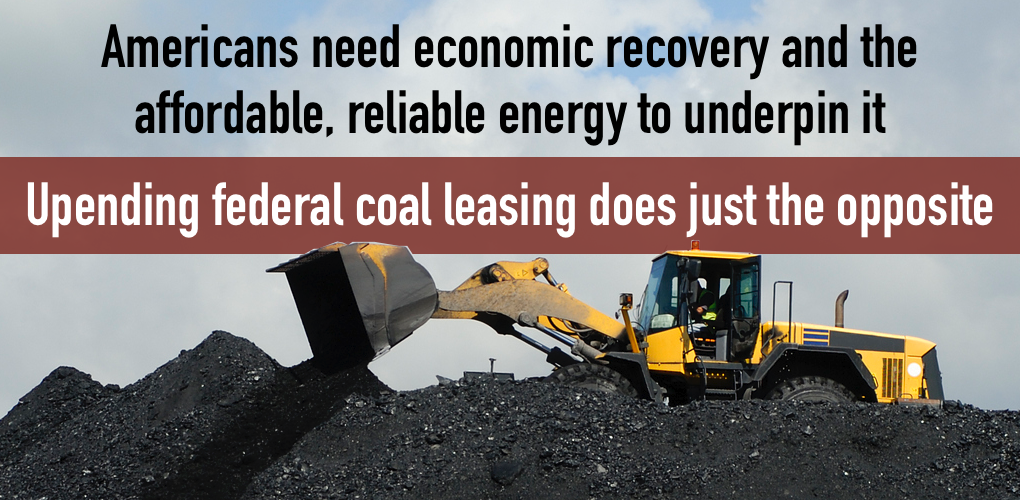
Dismantling Energy Security During a Global Energy Crisis
One of the clear lessons of the ongoing global energy crisis is the danger posed by policy that limits supply of essential fuels while demand remains as strong as ever. Across the globe, policy-induced tight supplies of oil, natural gas and coal have left economies reeling and governments scrambling to provide consumers relief and shield energy-intensive industries from soaring prices.
As the U.S. works to responsibly manage the energy transition, policies that threaten affordable, secure energy supplies should be non-starters. Dismantling production of the fuels the country relies on – and will continue to rely on well into the future – before the grid and energy infrastructure of tomorrow exists is simply a recipe for disaster. Yet, anti-coal mining provisions included in a draft of Congress’ reconciliation bill would do just that.
These measures, which include halving of lease terms for production on federal land, the establishment of new severance fees, and the repeal of the Department of the Interior’s discretion to offer royalty relief or deferred bonus payments, are designed with one purpose: make coal production from federal lands so uncompetitive as to end it. How burdensome will this cocktail of policies be? One producer estimates that they alone could face $100 million in new, annual costs.
A Threat to Affordability
Dismantling a bulwark of the nation’s energy industry during a global energy crisis is so irresponsible it almost seems farce. Yet, with winter energy prices soaring that’s exactly what House Democrats are proposing to do. They are determined to take apart the nation’s energy price shock absorber at the very moment voter concern over energy affordability is soaring.
According to recent polling from Morning Consult, 85% of Americans are concerned about rising energy prices. Morning Consult has also found that for more than 40% of low-income households, the rising cost of energy has become a top concern.
While the authors of these provisions likely believe coal production and generation are no longer essential pieces of the American energy equation, reality emphatically refutes that belief. With domestic natural gas prices more than doubling in a year, coal demand has jumped. The U.S. Energy Information Administration expects coal generation to rise 22% year over year as it claws back market share from natural gas, shielding rate payers from surging gas prices.
On several regional grids, coal will be the largest source of electricity this winter. The optionality provided by the coal fleet – and the domestic coal production that ensures affordable, secure supplies of coal – can’t be easily replaced. We’ve seen as much in California, Texas and now Europe. Policy that dismantles the energy production and energy infrastructure that we have before the grid of tomorrow exists is a policy mistake Americans simply can’t afford.
A Crushing Blow to Mining Communities
The damage inflicted on the nation’s energy security and affordability by these misguided provisions will be severe but pale in comparison to the pain they could inflict on rural mining communities and the states and tribes that depend on the economic engine of coal production on federal lands.
The federal coal leasing program has delivered more than $9 billion in federal, state and local revenues over the last decade.
Thirty-seven states consume coal from federal lands to generate electricity and fuel industrial and commercial facilities. The jobs and revenues from this production have lifted state and local economies across the West. Coal wages are between 150% and 200% of the average wages across all sectors in states with federal coal production. Beyond the mines, federal coal production has created and sustained tens of thousands of high-wage jobs in other sectors including transportation, construction, equipment manufacturing, mining services and power generation. This is in addition to the revenues from federal royalties, bonus bids and surface rentals that are split between the federal and state governments.
Operations producing federal coal also pay a range of state and local taxes. The scope and amount vary by state, but they include severance or production taxes, sales taxes, real property taxes, personal property taxes and employment taxes. For example, in 2020, the financial contribution from federal coal to Wyoming state and local governments in the form of taxes, royalties and fees was over $550 million – revenues that underpin education and school construction as well as highway maintenance and other county and city infrastructure projects.
Tribal lands that rely heavily on federal coal leasing will be hit particularly hard. Writing to Speaker Nancy Pelosi, the Crow Tribe explained that, “in Montana and especially on the Crow reservation, thousands of coal jobs help drive our communities, and further taxes on these activities will push our lands and our peoples into further hardship…. The Crow Nation is rich with coal, and yet our unemployment is almost 70%. We don’t need new taxes, we need less tax burden on our resources.”
For a bill that is supposed to help Americans “build back better,” these measures are simply job killers. They will do terrible economic damage, particularly in the rural communities that mining calls home, all while threatening a critical piece of the American energy equation. Americans need economic recovery and the affordable, reliable energy to underpin it. Upending federal coal leasing does just the opposite.
- On November 3, 2021
